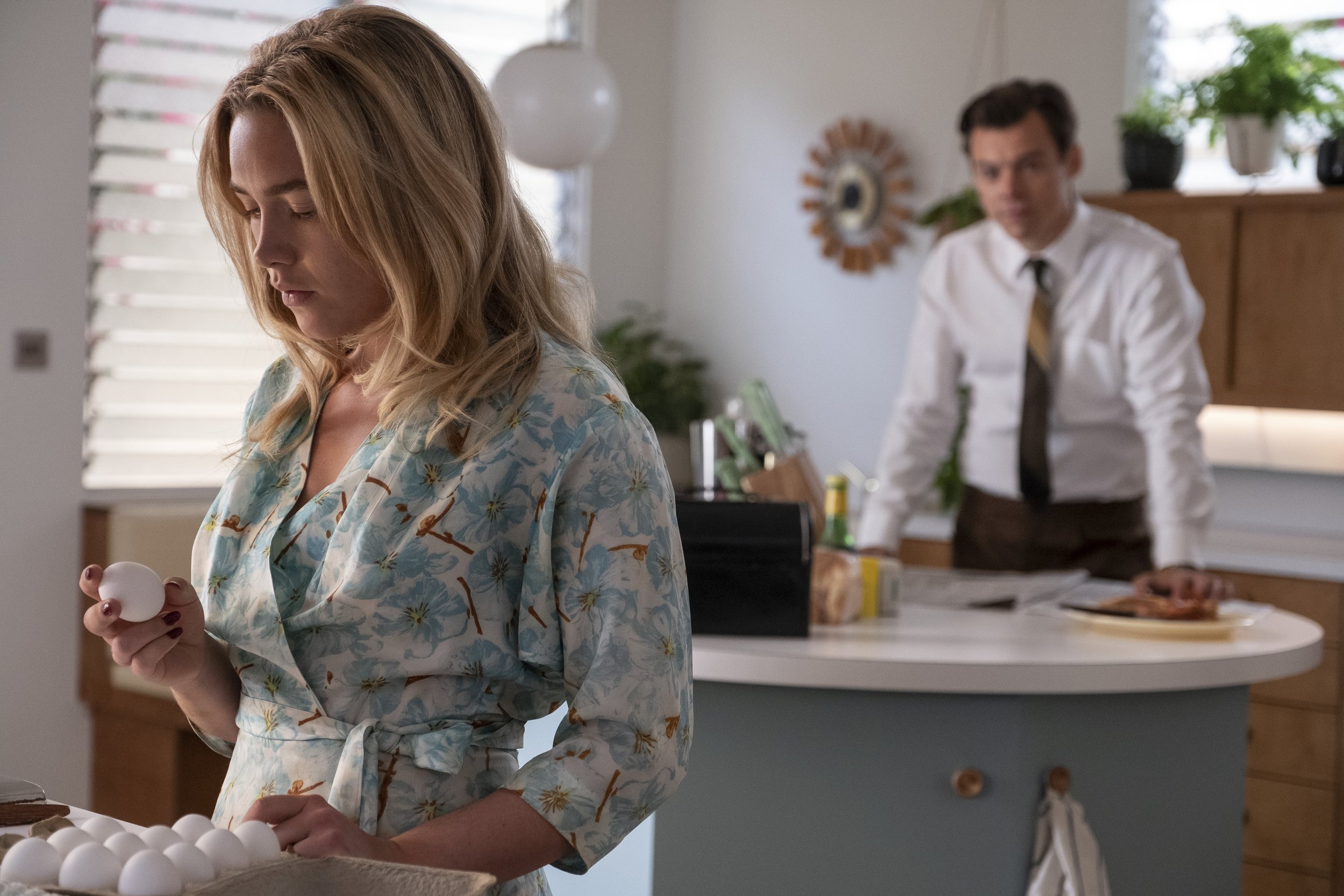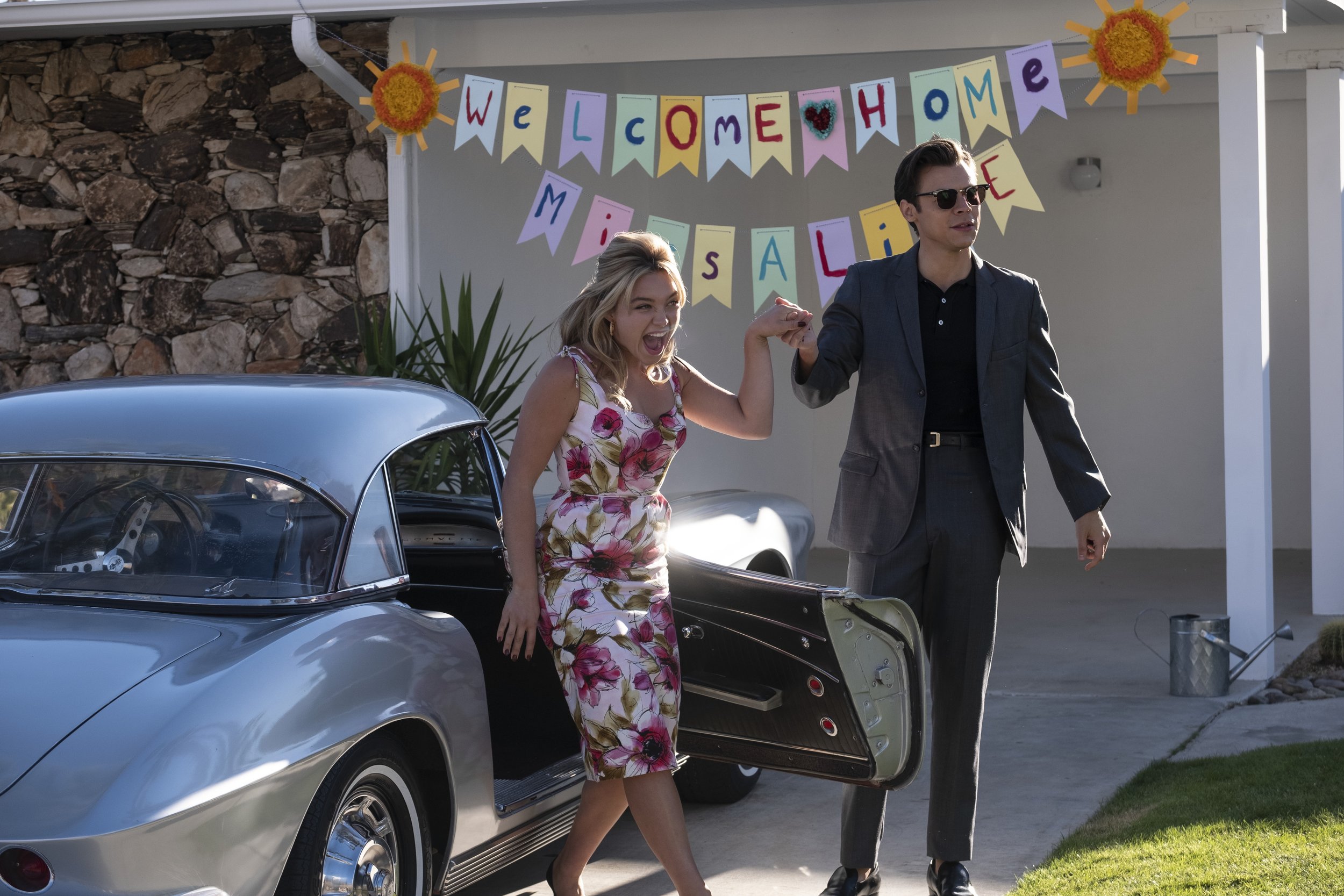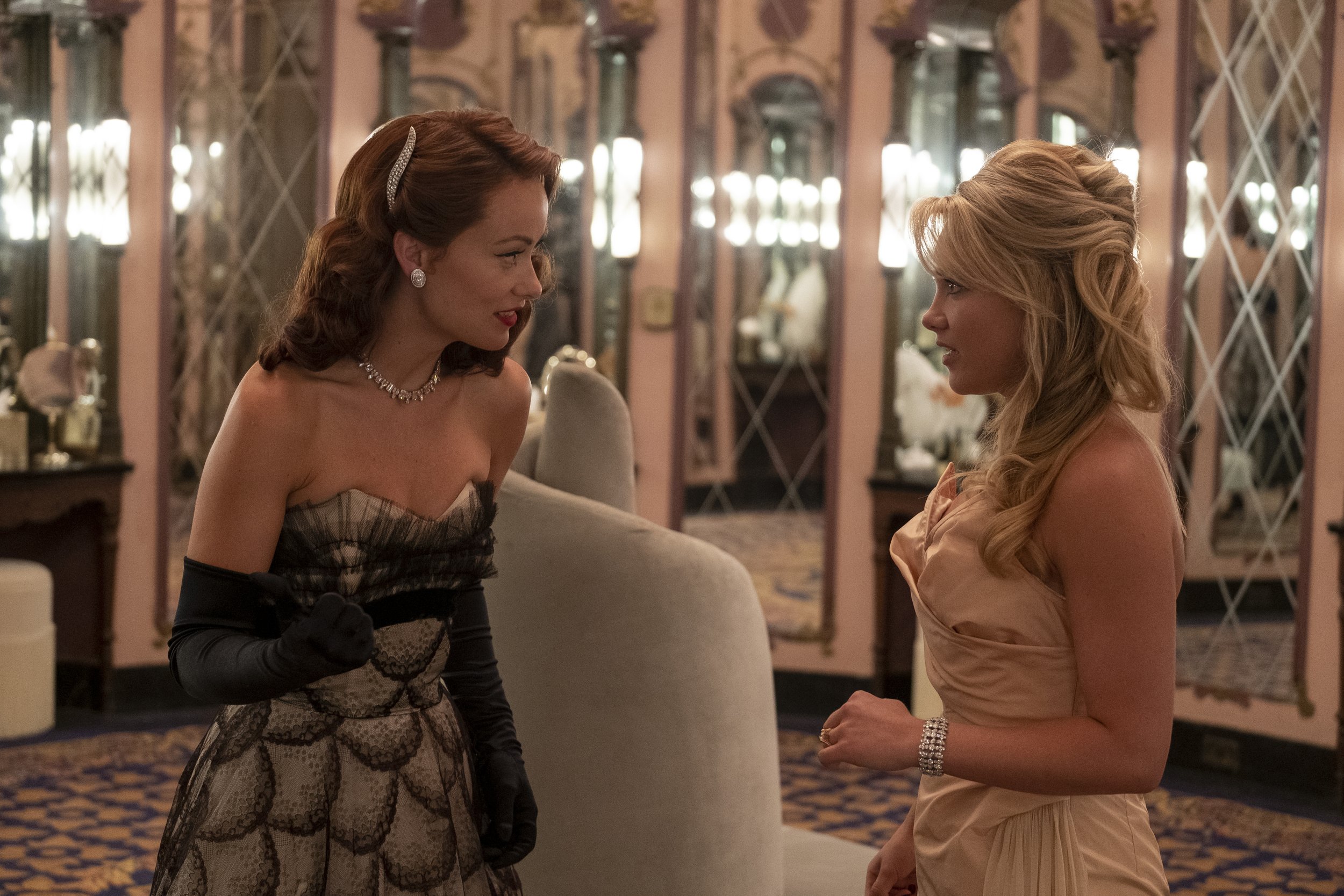MOVIE REVIEW: Don't Worry Darling
DON’T WORRY DARLING– 4 STARS
Within a swanky soundtrack of 1950s toe-tappers, the press materials from Warner Bros. for Don’t Worry Darling feature and favor lyrics from “Sh-Boom” by The Chords that read:
Life could be a dream (Sh-boom)
If only all my precious plans would come true (Sh-boom)
If you would let me spend my whole life loving you
Life could be a dream, sweetheart.
Just like when the song played during a small-town cruise in Pixar’s Cars 16 years ago, “Sh-Boom” tingles innocent hopeful feelings. Here in Olivia Wilde’s mindbender, the song is a varnish over a nightmare. The better and slicker early tune used in the film would be the Great American Songbook selection “Where or When” by Peggy Lee and the Benny Goodman Sextet serenading the introduction of the glossy setting of the film. Played for its lovely romantic style and female voice, the lyrics creep into your psyche if you listen closely:
It seems we stood and talked like this before
We looked at each other in the same way then
But I can't remember where or when
The clothes you're wearing are the clothes you wore
The smile you are smiling you were smiling then
But I can't remember where or when
Some things that happen for the first time
Seem to be happening again
And so it seems that we have met before
And laughed before and loved before
But who knows where or when?
When you're awake, the things you think
Come from the dreams you dream
Thought has wings
And lots of things
Are seldom what they seem
Sometimes you think you've lived before
All that you live today
Things you do
Come back to you
As though they knew the way
Oh, the tricks your mind can play!
Now, the varnish swirls with the dreamy deja vu vibes that are all over that old standard. In many ways, those two main verses of “Where or When” tell you all you need to know about the encroaching mystery to come. By the time Don’t Worry Darling calls back to “Where or When” again during its kaleidoscopic end credits, a smoky aftermath is exhaled from the intoxicating effects of the song and the film.
Little Women Oscar nominee Florence Pugh and One Direction Grammy winner Harry Styles are Alice and Jack. Their young couple is soaked in booze and flush with young love. They are one frivolous married pair of many that occupy a mid-century southern California cul-de-sac where the men go to work as synchronized commuters and the women embrace their homemaker zest pining for their returns and downing more cocktails. The slices of charmed lives these neighbors enjoy is afforded to them by the Victory Project, an isolated community organized by Chris Pine’s enigmatic Frank.
Spoken of with strict and unified devotion and living among them with his ballet instructor wife Shelley (Gemma Chan of The Eternals), Frank has recruited these handpicked men for undisclosed and ambiguous roles at the guarded worksite nestled in the surrounding desert hills. Stumping for his own cause any chance he gets, including his vocal commentary on the local radio channels, Franks preaches his aim for a “different and better way of life” that will “change the world.” He seeks people of “pure, unbridled potential” and warns how “chaos is the enemy of progress.” Meanwhile, the heads of the households work on the “development of progressive materials” and “seek a gem of immense value.” Heaven forbid they question the boss.
LESSON #1: KNOW WHO AND WHAT YOU ARE WORKING FOR– Just don’t mind the occasional ground tremor in town and ignore the frantically-frozen housewife Margaret (If Beale Street Could Talk’s KiKi Layne) who’s denying her meds. The vague importance pontificated by Frank and the whispers of portended doom from Margaret begin a myriad of question marks for the curious Alice. As she probes the limits and boundaries of their collective after witnessing what she thinks is a plane crash, Alice finds more secrecy and unwanted attention. Next thing you know, she’s the next target for the label of madness and nonconformity in Don’t Worry Darling.
All those quotations from Frank two paragraphs ago certainly lean on nefarious cliches. Chris Pine owns his scenes with charismatic snake oil that softens what would normally be blunter with either gross evil or panache that you cannot take seriously. His gaze lands somewhere in the middle to flatter the women and coaxes nodding loyalties out of the men. For his Frank, it’s all about containment because he knows he can.
LESSON #2: A WIFE’S ROLE– With this antiquated period setting, the outdated decorum is stressed early about a woman’s role in the family. By Frank’s edict, they are meant to maintain a supportive home and understand that discretion, above all else, is paramount as the men have their reasons for leaving work at work. With that allegiance at heart and echoing yet another stellar soundtrack choice of “To Know Him is to Love Him” by The Teddy Bears, Alice dotes on Jack every chance she gets. He reciprocates where can, only for that to become more challenging as she investigates for answers.
LESSON #3: “DON’T GET HYSTERICAL!”– By golly, how many women have been hit with that verbal warning shot, one commonly joined with “Get a hold of yourself!” as a second combination strike. More often than not, the women have their composure, but they’re patronized as lesser intellects. How much tone-policing occurs on drama deemed unallowed by someone else? How many issues get dismissed. At some point, those women do not get discredited like Chicken Little. They boil over because they were never fully acknowledged or quelled. That’s the dangerous predicament in Don’t Worry Darling for Alice made worse when Jack stops believing her for fear of losing their lavish lifestyle.
For example, there’s a sly scene of dichotomy later in the film typifying this divide. Jack, in a full tuxedo, is dancing on stage in his perceived rightful place at the top of his world after receiving a public promotion and endorsement from Frank. Self-gratifying adulation surrounds him. The moment is far different for Alice. Combined with the editing of frequent Todd Haynes and Jim Jarmusch collaborator Affonso Gonçalves, Jack’s gyrations are intercut with Alice on the ballroom sidelines writhing in an aching panic of her own contortions. Their emotions are split and will likely never be healed without drastic events to follow.
Don’t Worry Darling lives and dies by the convincing power of Florence Pugh portraying this tailspin. Much like his previous work on Darren Aronofsky’s mother!, cinematographer Matthew Libatique’s camera and blocking rarely leaves Pugh and encircle her mounting dread. The 26-year-old Brit exudes frazzled tenacity with the same measured exactness as her boundless passion. Her entire range of mettle in this film is captivating.
Director Olivia Wilde, no stranger to captivating screen presence herself as an actress, provides Florence Pugh every opportunity to shine through this sun-baked wringer. Harry Styles cannot keep up, but it matters little with this being Pugh’s showcase. She is more than strong enough to get behind. Still, the slow boil to Chris Pine’s puppeteering above would have been helped by more intimate strife from the loving man across from the lead.
Wilde’s past Booksmart and future Spider-Woman screenwriter Katie Silberman penned a twisting thriller with, admittedly, less confusion than a Jordan Peele film by comparison. A few large scripted surprises are easy to sniff out. Others, however, get impressively daring. Still, dabbling in this kind of heady territory will pose problems with the fickle levels of audience disbelief that demand more stamped out answers than dangling questions when it’s all said and done.
With that in mind, soften the scalpels of credulity with Don’t Worry Darling. You’re not going to get told everything, and, honestly, you shouldn’t be. Know that you are entering pure mindfuck territory. Wilde’s bold presentation is a worthy entry into that pantheon of rug pulls and repeat viewing potential, even if it’s to measure missteps versus successes.
LOGO DESIGNED BY MEENTS ILLUSTRATED (#1068)









